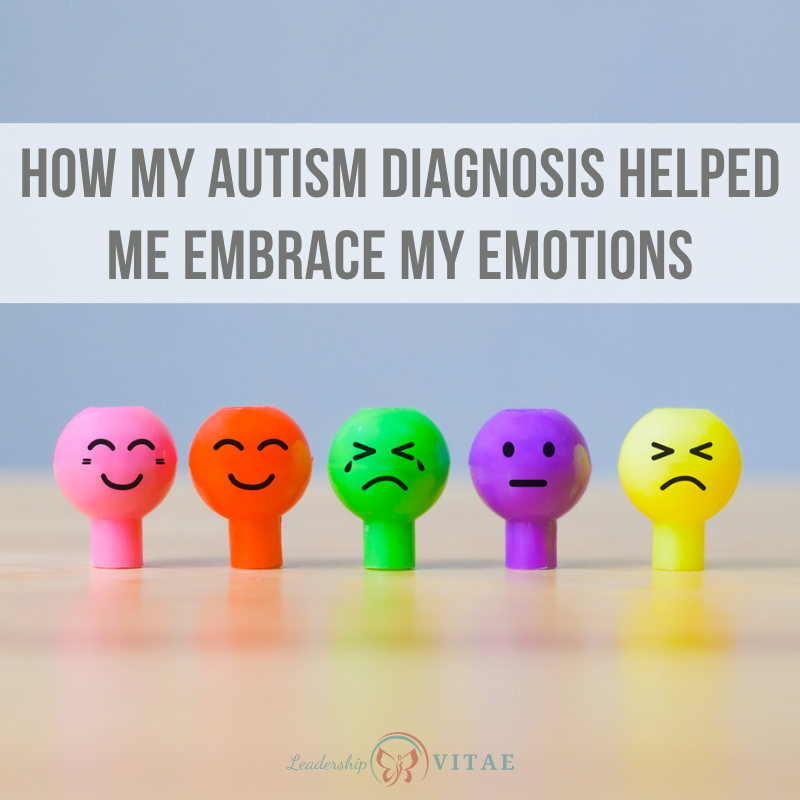
I fought my emotions for most of my life. I either thought they were messy and out of control, or that they didn’t exist. There was no middle ground.
Growing up in a military (dysfunctional) family, I had both extremes as examples. My father is an ‘acts of service’ guy, rare to be demonstrative or articulate any sort of emotion. My mother, on the other hand, was very expressive. Though not particularly reliable in what she expressed.
Logic and facts were lifeblood in a chaotic environment. Emotions were not to be trusted, just something to get over or push down.
Later, when I started working for the Marine Corps, I was surrounded by stoical men and virtually no women. My peers, leaders, friends, and romantic partners were all fairly similar. There were no good examples of how to show emotion, which was problematic when I struggled to keep them inside.
Stoicism has had an appealing quality to it. It centers on the idea that our reality exists in the mind, and therefore under our control. If emotions are roiling, the mind in theory can put them in context and logic them away.
Sound in theory, but in practice, maybe not that healthy. As I’ve looked to better understand my journey with AuDHD (ADHD+Autism), I’ve discovered that my emotions are still there. They are just coming out in other ways.
I don’t want to be a stoic any longer.
Where emotions show up
Emotions have always been difficult for me to understand. When someone asks me if I am anxious, for example, what does that feel like?
There are some emotions that are easier than others. Anger and frustration are simple. If I find myself raising my voice or getting impatient and snappy, those are easy signs. Happiness and joy are generally obvious if I’m laughing or smiling.
The more I read about Autism, the more I’m realizing that my emotions show up in the body. That has been helpful and explained a lot about how I’m processing the world around me and my life-long health issues.
For the longest time, I’ve gotten unexplainable abdominal pain. It’s only been in the last 2 years that I’ve been able to tie it to anxiety or dread, almost always tied to some sort of relationship. Headaches are more common when it’s related to work.
Unfortunately, that often means I’ve been dealing with heavy things for a while before it shows up to the point I can recognize it. Whether we are neurotypical or neurospicy, our minds and bodies provide us with signals when things are going awry. The key is to notice and act on the information, because ignoring the signs comes with risk.
Closing out emotions comes with consequences
I can recall several times in my life being overwhelmed with emotion and mentally constructing a door. The difficult emotions were pushed to the other side and the door closed. Problem solved. Unfortunately, some good things went out the door with the bad.
When I decided the pain of a loved one hurting me was too much, I put the hurt on the other side of that door. To make the pain stop, what remained of any loving feelings had to go with it. Once that door was closed, I had no idea how to open it again, even if I wanted to.
Logically it made sense. Pain sucks. Long-term pain can be devastating. If we can, why wouldn’t we close the door on it and decide not to hurt anymore? The brain is very powerful and open to suggestion. Once I decided I was done hurting, I closed the door to conscious awareness of that pain.
Unfortunately, that didn’t mean the pain stopped. One kind of pain was over. But by shutting the door on the emotion, it showed up somewhere else.
I’ve started to notice how unaddressed/unrecognized emotions are showing up in my body. Relationship-related stressors cause abdominal pain. Work-related stressors trigger headaches. When early signs are ignored, heart issues can arise. My inability to recognize how emotions were showing up meant they were trapped and put my health at risk.
Emotions are meant to be felt, not just mentally processed and pushed away.
Discovering how to honor emotion
After years of protecting my heart, I’m taking the biggest emotional risk of all in a new relationship. I must be in tune with my body and listen closely because it will tell me things long before I’m consciously aware of them.
Early in the relationship, I was having trouble sleeping. My brain would wake me up, going through all sorts of what-if scenarios. One morning, abdominal pain started. It was a day I was going to see my person and I really didn’t want to stay in bed all day in the fetal position, which was a very real possibility.
Instead of pushing it down, I got curious. What is this trying to tell me? What might I be feeling? If this was tied to anxiety, what was I worried about?
I used my mind to logic out what I needed that I wasn’t getting in that moment. We were spending the day together and I was nervous. I have always struggled with interpersonal interaction and dating can be the worst, even before adding other challenges.
Inventorying what might be triggering my anxiety, I tried to give myself what I needed. Reminders that I would be safe. That I am whole and complete without another person in my life. That my combination of personality traits and behaviors are by design, and my person will embrace them, not excuse them.
The pain receded. It was the first time I’d been able to interrupt it. Since then, I’ve approached pain with curiosity to better understand what it’s telling me. To be compassionate with myself and find ways to self-soothe in the face of strong emotions trapped in my body.
Emotions are a critical signal on our journey
No matter how our minds and bodies are wired, we get signals. There may be too many, leaving us overwhelmed and tempted to shut them off. Whatever we need in the moment, we can have compassion for ourselves and the difficulties we are facing.
Maybe today isn’t the day, and we must create space to address the signals when there is less noise. We may need support to help us voice what we’re experiencing and find ways to address it.
There is no one way to feel or think. Not one signal that works for everyone, or one way to receive it. Instead, we must find our own path to integrating our brains and bodies that works for us.
While I am focused on my emotional growth, that doesn’t mean I’m kicking my brain to the curb. It’s what is allowing me to be curious and face fear with reality.
Our mindset AND emotional awareness need to be partners on our journey. We can’t completely rely on one without the other.
Knowing our emotions, and honoring them, can help us process them and let them go. Being a stoic means knowing our perception controls our reality, but we do not have to – can’t afford to – pretend emotions don’t exist. They will come out. Either in a healthy way or in a way that hurts us.
* * *
Thank you for reading about my journey. If this resonates or doesn’t, I’d love to hear from you. I realize now that I’ve been writing from the neurospicy lens all along and I sincerely hope that everyone finds something relevant in what I share.









2 Responses
Wow, such an interesting read! I’ve been on a journey with my neurospicy son, and attempt to learn from him. I realize because I am conditioned to believe emotions are to be expressed. If he doesn’t/didn’t I use to worry, or would be disappointed because I interpreted it as not being interesting or appreciated. However, along our journey as mom and son, I have gotten over myself and my conditioning. I realize just because he may not express himself the way I would, he expresses emotions, thoughts, feelings differently and it is up to ME to learn.
I love this Brandy. I expect we all have some level conditioning, whether we are neurospicy or neurotypical. It took me coming to terms with my own emotions and expression to then reframe my father’s “lack” of emotional response. Turns out we are even more similar than I expected, but I was judging us both by unfair expectations. Your support of your son and your journey – they are wonderful to hear. Having someone(s) in our lives that accept and celebrate us as we are is so important.